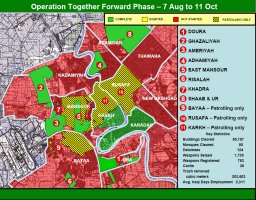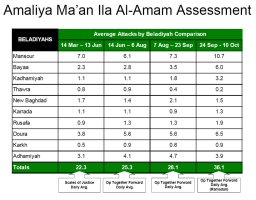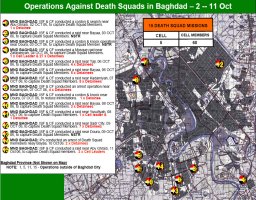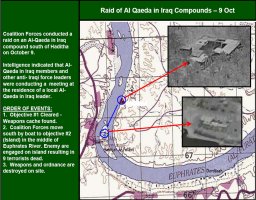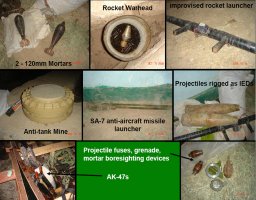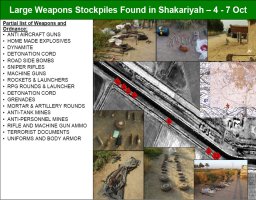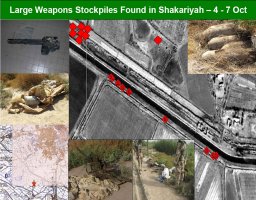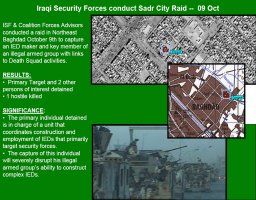
Operational Briefing, Oct. 12, 2006
Multi-National Force-Iraq
Thursday, 12 October 2006
IRAQ OPERATIONAL UPDATE BRIEFING BRIEFER: MAJOR GENERAL WILLIAM CALDWELL, USA, SPOKESMAN, MULTINATIONAL FORCE-IRAQ LOCATION: COMBINED PRESS INFORMATION CENTER, BAGHDAD, IRAQ TIME: 8:00 A.M. EDT DATE: THURSDAY, OCTOBER 12, 2006
GEN. CALDWELL: These past few days, I had the privilege to visit with our South Korean coalition partners in Erbil, where they are doing some absolutely remarkable work. Their 2,200 service members are working every day to improve the lives of the Iraqi residents that live there. At Camp Zeitoun, where they have been since September of 2004, the Koreans have built a hospital equipped with operating rooms staffed by 19 doctors and 15 nurses, and have treated over 40,000 Iraqi residents to date. They have also opened a vocational training center, where they offer computer and banking courses, as well as training in maintenance and repair of home appliances, generators and cars. These subjects were chosen with input from the local authorities as to what would benefit the local economy, and more than 900 local Iraqi citizens have attended the classes. They have also trained the Iraqis to teach these classes themselves so that these programs will become sustainable. Among other projects, they have completed the building of 15 schools, 10 primary health clinics, as well as 60 village water wells and tanks. The Multinational Force is grateful for the participation of South Korea in the coalition, and the residents in Erbil province are very fortunate for their efforts in developing sustainable economic and reconstruction projects. Erbil province has seen amazing economic revitalization in recent years, which has been enabled by a stable security situation there. Security and economic transformation throughout Iraq will go hand in hand. Iraq is rich in resources, which should sustain optimism for its ability to regenerate itself. The government of Iraq understands that a vibrant economy can go far in tempering extremists elements. Encouraging international investment will foster not only employment for Iraqis, but also hope for this country's future. General Casey put it aptly yesterday when he said that violence and progress can coexist in Iraq.
I'd like to highlight some initiatives by the government to move their country towards prosperity.
On October 4th, Turkish and Iraqi delegations resolved a three- year-old dispute where they agreed on a payment scheme for disputed arrears for fuel imports totaling around $200 million. The arrangement was desperately needed to help open trade and alleviate Iraq's fuel shortage.
Although Baghdad employment is at an estimated 30 percent nationwide, the government understands this, and is working on the funding for an employment program in Baghdad that would train and employ 100,000 young men for two years.
In September, Iraq produced an average of 2.4 million barrels of oil per day. Oil production has met or exceeded the goal of 2.2 million barrels of oil per day for the past six consecutive months. Through September, revenues from oil sales exceeded projected estimates by approximately $1.5 billion.
The Council of Representatives passed in September the fuel important liberalization law to thwart black market sales and improve fuel supply and reduce corruption by opening up the energy sector to private investment. The government is currently developing regulations related to this important piece of legislation, which should be in place by the end of this year.
On Tuesday, the Council of Representatives diligently passed an investment law. This law will provide a legal and regulatory framework for companies -- foreign companies interested in investing in Iraq. The Iraqi government is also drafting a hydrocarbon law to ensure fair and equitable distribution of the natures of this country's future oil revenues.
Lastly, I'd like to highlight a significant event with regards to governance and the issue of federalism. The Council of Representatives yesterday passed a law on executive procedures to form regions, which we refer to as the Region's Law. This law lays out the procedures provinces must follow to form regions should the voters choose to do so in a local referenda. This is a great beginning to addressing the worries of many Iraqis on fair distribution of wealth and political power.
All of these events are critical for Iraq's future. As we have stated, if you want prosperity, you must have security. And if you want security, you must have unity. We know this, and the prime minister knows this.
Last week, we discussed some key efforts towards reconciliation, and this week towards economic revitalization. The multinational force and the U.S. mission in Iraq supports the efforts of Prime Minister Maliki's government to diligently work to stabilize the security situation, increase prosperity and unite this fractured population. If I could, I'd like to now turn to some of the security situation and ongoing operations currently ongoing in Baghdad.
Slide and chart, please.
Iraqi security forces, with coalition forces in support, have not begun any new search-and-clear operations for the past two weeks. We have, however, continued with patrolling operations in these areas here and that look like tan here and, if you look up on that chart, slash lines. But these are strictly patrolling operations and not clear-and-hold areas. Again, the clear-and-hold areas are those, again, that we've identified before, in green, and operations continue in those areas still today.
Overall statistics show in here change from last week, obviously, in many of the areas. But those operations continue on in the city.
We have seen positive effects from our combined operations and Operation Together Forward, phase two. But anti-Iraqi forces and death squads continue to attempt to challenge the government of Iraq's progress in this area.
Slide and chart, please.
This chart shows the average daily attacks in Baghdad, broken down by beladiyas. And again, I just want to emphasize this is only attacks; it has not a direct relationship to casualties.
This was Operation Together Forward when it first started, until the 6th of August, when we went into phase two. That was the average daily total of attacks, 25.3. If you take the period from 7 August to 23 September, there is an increase of three attacks per day overall across the beladiyas, predominantly brought on by the fact of the last two weeks in September. If we were to break -- have broken out those last two weeks just before Ramadan, this would drop significantly.
And then this is the Ramadan period, from 24 September through the 10th of October. And you can see the tremendous spike that has occurred in the daily number of attacks, as we've discussed, that are current across the Baghdad area.
Total attacks in Baghdad are up approximately 15 percent. However, operations have been effective in the neighborhoods we've cleared and continued to protect, where attacks have decreased by approximately 11 percent.
As I've stated previously, Ramadan has been a period of increased violence, and you can see that on the daily chart there. Historical trends tell us that the attacks will generally increase by 20 percent during this holy month of Ramadan. We assume it will still get worse before it gets better. We expect violence to continue to increase over the next two weeks, until the end of Ramadan.
Slide and chart, please.
The increase in attacks is directly attributable to the aggressive Iraqi security forces and coalition force efforts targeting death squads and their greater presence throughout the Baghdad area. If I can, I'd like you to focus on the 15 operations that were conducted during the last week-plus period specifically against death squad activities in the Baghdad area. Four of these, not shown on the map, were just outside the Baghdad province area, right around the city itself.
And again, as we've discussed before, if you take, for example, number 10 here -- that was an operation that was conducted -- you can look over here on this map, and again it will tell you the date that the operation was conducted and then what the result of the operation was; in this case, three detainees. Overall from that nine-day period there, nine cell leaders were apprehended and 60 cell members were apprehended through those operations that were conducted across the Baghdad area.
Slide and chart, please.
Civic operations are ongoing, too, with security operations. Iraqi security forces, while fighting the enemy, are also assisting the Iraqi people with critical services all across Iraq, and especially here in the Baghdad area. On October 9th, the Ghazalia and Shula Neighborhood Advisory Councils coordinated for 50 generators to be distributed to local area schools. Headmasters from most schools appeared at their Neighborhood Advisory Councils to receive their gifts personally. The 1st Brigade of the 6th Iraqi Army Division helped with the transport and distribution of these. Thirty generators were distributed to the Ghazalia area and 20 generators to the Shula area.
This is just one of the many civic projects ongoing in Baghdad and aimed at improving the lives of the Baghdad citizens, especially in the focus areas. Still more needs to be done, and the Iraqi government is working hard to make that happen.
In other operations across Iraq, the elimination of weapons and munitions had remained a priority.
Slide and chart, please.
On October 9th, security forces conducted an early-morning raid on an al Qaeda in Iraq meeting place south of Haditha adjacent to the Euphrates River. During the first part of the operation, as you can see here, they went after a safe house here where they in fact found a large cache of weapons and munitions at this location. After securing that by amphibious assault, they moved out to this island location where the meeting place was taking place in this building here. And in fact, during the ongoing operation they ended up killing nine of the terrorists and found additional large amounts of weapons there, too.
Slide and chart, please.
These are some of the weapons and ordnance found, which include rifles, a mortar tube and rounds, grenades, rocket launchers, an SA-7 surface-to-air rocket, already-rigged improvised explosive devices, and materials to create such devices. Similar ordnance was also located in boats in the river adjacent to this location.
The security forces did destroy all weapons and ordnance and the boats prior to departing this location.
Slide and chart, please.
In Shakaria, southwest of Baghdad, Iraqi security forces with coalition forces assistance discovered approximately 30 weapons and ordnance caches spread over a large area while conducting an operation. The operation was initiated on the 4th of October, and during the search down in that area, the first thing they did was happen to stop this large truck here that was carrying gravel. And just to point out a couple things associated with this truck that was carrying gravel right here -- you can see much better in this picture -- when they moved the gravel, they in fact found underneath a false bottom with a tremendous amount of ordnance and weapons underneath that. That led them to continue operations. Each one of these red dots on this map here are particular areas where they did in fact find further ordnance.
These are just displays of some of the different weapons systems that were found. This operation did last over three days.
Slide and chart, please.
These are some aircraft bomblets that were found. This is an anti-aircraft weapons system that was found. Not a great picture here to be seeing this one, but this is some automatic weapons systems, some more bombing-making material and a Gatling gun. And again, all together during the operation that lasted three days, when
Iraqi security forces started this operation and uncovered the first cache and first the truck and then at first a couple of caches, they requested additional assistance from coalition forces to fan out over more area. The operation lasted three days, and they found over 30 caches, again, of weapons and ordnance during that time period. There were two detainees taken into custody during that operation.
In conclusion, Iraqi security forces are proving their medal every day on the streets in various operations. The government is persevering steadfastly to bring Iraqis to the table and negotiate grievances with words and not violence. The parliament is pursuing legislation to foster economic growth, and we are equally encouraged by what is not visible to the general public. Much of the government's efforts and negotiations are happening behind the scenes creating increased momentum for progress, but it is true that the levels of violence are high. But the government and security forces are working on many levels to alleviate the issues behind the violence and create the conditions for a better future. The multinational force supports these efforts, and we are optimistic that we'll soon see the fruits of this labor. And with that, I'll take whatever questions you may have.
Yes, sir.
Q James Hider from the London Times. General, you've been rounding up death squads for several months now, interrogating them and getting intelligence. Can you give us a profile of what the death squads are like? Who they are? Why they're doing this? What they hope to get out of it?
GEN. CALDWELL: What we have found from most of -- we in fact find them on both sides, the extremist elements of both Sunni and Shi'a. It's one or the other; in fact, it's both elements. We are in fact finding that it's really truly just for pure killing. It used to be initially for kidnapping and assassinations. With the increased presence of the Iraqi security forces and coalition forces in the city, it has shifted more to murders that were generally conducted on the spot versus trying to kidnap and move somebody to another location, where they would normally go through the process of torturing those who they have or attempting to extort them for monies. It tends to be more now today, because of the increased coalition and Iraqi security force presence out there, that they occur on the spot because of the inability to move freely throughout the city. But it's purely sectarian violence that we see that's occurring with these two elements out there, vying for both the political power and economic power in the city.
Q Are you seeing any organization -
MR. WHITMAN: Microphone.
Q Sorry. Are you seeing any traces of organization behind it? And if so, who?
GEN. CALDWELL: There is. There's various levels of organizations that occur. Some are very independent. Some others have some degree of organization behind them, and obviously we continue to monitor and target those elements very closely, and that's specifically why we were able to break out and say we're going after cell leaders sometime, because we're able to actually identify and target specific individuals that are in charge of some little group that in fact is carrying out this sectarian violence.
Next question? Yes, John?
Q General, John Burns, New York Times. Can you tell us a little bit about the current disposition of the United States and Iraqi forces towards the Mahdi Army? I'd cite as an instance, one of the things that's intrigued us is the attack on the Falcon ammunition dump, where I believe the command statement spoke about civilians associated with a militia group, and made a note of the fact that it came from a Shi'a area. That sounded very much as though the command was trying to tell us that this was a Mahdi Army-associated group. We know that you went into Diwaniyah in force after somebody who was Mahdi Army -- Sadrists -- may be rogue, may be not. My impression is that this is very murky and that both sides, that is to say, Sadr and the U.S. command, have found reasons for the time being to keep it murky for political and other reasons. So if you could address the Falcon attack, and then tell us whether or not, from the coalition point of view, that the Mahdi Army remains a major threat to the security of Iraq.
GEN. CALDWELL: First of all, I'll take on the Falcon attack. And it was caused by indirect fire, a mortar that did in fact hit our ammunitions supply point there, which caused a tremendous amount of secondary and tertiary explosions that occurred throughout the night there. There's that one particular area which fled into another area -- did in fact go off all night. Very fortunately, no coalition forces or Iraqi security forces were injured, nor civilian casualties that anybody's aware of at this point. We lost some munitions, but took no personnel casualties.
The exact group that's responsible, we're still investigating. Obviously, we're trying to link that back to a particular element that may have been involved, and at this point it would be inappropriate to really talk about it because obviously targeting is going on as they're continuing to work that because of some leads that they've been able to pick up at this point.
But I guess what I'd tell you, John, is that this whole question about militias is a very challenging one. I mean, the government is faced with a difficult task here, and it's one that they're dealing with on both the political spectrum and a security spectrum. And in one sense, the government is handling and working the political aspects of this. I know it's something that they have diligently taken on or looking for a political solution. But at the same time, if in fact we find somebody operating outside of the law, regardless of whom they may or may not be affiliated with, then we're going to target them.
I mean, I think the best example I could give you is the raid we did in Sadr City just a couple days ago. It didn't garner a lot of press because we were able to go in, conduct the operation, secure the one individual along with five other personnel -- in fact, how about if you give me the backup chart, would you, please? Backup chart one?
This is the location within Sadr City where the operation was conducted, up here in the corner right here.
More specifically, you can see it there. You can see the troops from the operation that night coming in towards the objective site. They drove into Sadr City. Primary target -- it says two here -- it was actually five persons that were detained. There was one hostile that was killed in that engagement, but there was no escalation of force required other than that. So they were able to get the specific person in question.
The reason we went in -- that person we assessed to be an IED maker and key member of an illegal armed group that had links clearly to death squad activities. No question who this person was, and we wanted him. He had been on one of our high-value target lists, and he's now currently in detention, along with five other personnel we picked up at that site.
So I mean, we're conducting operations still throughout the city. It's not any one particular focus area. If we find somebody like this -- doesn't matter where they are -- and they're operating outside the law, we're going to go after them. We just did it on the 9th of October, just a couple days ago.
Q If I could have a -- let me ask a supplemental -- General, I don't see the word "Mahdi Army" there. And as a matter of fact, since before I left on leave in July, when there were major coalition raids being conducted in Sadr City, one thing that was notable was that the word "Mahdi Army" had just disappeared. In 2004, in April and August, you were involved in a full-scale uprising by that group. And at that time, there was no such, if you will, shyness about this. Indeed, American commanders said from podiums in the city that Sadr would have to be arrested. And it's intriguing that these days we just never hear from the coalition about the Mahdi Army, even when it seems palpable that the target is a Mahdi Army or a Mahdi Army- associated target. Is this because of the political sensitivity involved, considering that Sadr is propping up this government?
GEN. CALDWELL: John, what I'd tell you is that if you heard Joe Thurman talk a couple weeks ago, he said that within the city there were about 23 different type of militia elements operating there. If every time we engage a different group you're trying to attribute it to one particular element, we'd run ourselves crazy trying to ascertain exactly who somebody did or did not belong to.
We have taken the position that we're going to specifically state that if somebody's operating outside the law, we identify that, then we're going to go after them, regardless of whether they're on of these, as General Thurman talked about, 21 or 23 different militia elements that are within the city.
Clearly, they probably are all affiliated to some degree or form perhaps with one, but there's rogue elements out there, we know. There are extremist elements out there that -- to get down to that kind of classification is very challenging.
What we do know, like in this case here, on the 9th of October this gentleman that we seized right here was clearly a death-squad leader, was leading the element, was planning operations. We have very good, credible intelligence associated with that. And we went after him where he was located. That happened to be at this point in time in Sadr City.
But you also saw we conducted, you know, 15 other operations, 14 other operations throughout the city too over the last nine days, and they're spread wherever we happened to pick up somebody who's conducting death-squad activities or operating outside the law.
Yes, sir?
Q Thank you. Larry Kaplow with Cox Newspapers. Just very simple questions about the graphic. And thanks.
What's the definition of attacks? Is that just on --
GEN. CALDWELL: Good point. Larry.
Q -- who's that on? And the neighborhoods listed, that's the entire city of Baghdad, I guess, right?
GEN. CALDWELL: Yeah, that's correct.
(To staff) Can you throw back up the beladiya chart, please, that shows the number of attacks? Yeah. Larry, this was in response to your question last week asking -- this is what I assume you're referring to.
Q It was.
GEN. CALDWELL: This does. This includes the entire city. You got it up there, guys. This includes the entire city, where each of these are the beladiyas. Now, it's not the focus areas, and that's real important to understand. There's a very distinct difference. Within the focus areas, we have actually seen about an 11-percent decrease in the overall number of attacks, but about a 15-percent increase in the overall attacks within the city of Baghdad, as represented by the 10 Beladiyas here.
Q How do you get 15 -- (off mike)? I think you're using the wrong base for the 15 percent, somehow. How do you get 15-percent increase? Q (Off mike.)
Q Yeah. How do you derive that from this?
GEN. CALDWELL: I'll have to go back -- I'll be glad to go back with you on that and --
Q (Off mike) -- to 36 is more than 15.
Q It's about a 28-percent increase.
GEN. CALDWELL: Let me go back and look at the exact statistical data there. And that's part of the whole thing when we start -- everybody starts getting the numbers, they want --
Q Yeah.
GEN. CALDWELL: An attack can be anything. And Larry, that's the key point. It can be a simple person shooting a weapon in a drive-by at a building and they entirely miss, they hit absolutely nothing. It can be somebody throwing a grenade that does absolutely no casualty- producing thing. It can be an indirect mortar round that was fired. And it can be an IED that explodes and does produce casualties.
Q How about an execution killing? Was that --
GEN. CALDWELL: Yeah. Any kind of attack at all would register. And this is attacks against any kind of Iraqi citizen, coalition force; it's the entire gamut of attacks that occur within the beladiyas.
Q If a beladiya doesn't appear on there, General, is it because there were no attacks or there were no significant attacks? I don't see Amiriya there, for example.
Q (Off mike.)
Q Oh. So Amiriya would be under what?
GEN. CALDWELL: It would be encompassed within a beladiya.
Q (Off mike.)
GEN. CALDWELL: I don't have the --
(To staff) Can you go back to one other slide, please, to the big map.
Amiriya is encompassed here within the Mansour area. Right here is Amiriya, and it's encompassed in the beladiya of Mansour.
Yes, sir?
Q Last week you announced that the 8th Police Brigade had been disbanded because they'd been involved in death squad killings. Witnesses to General Amir al-Hashimi's murder said that the killers were dressed up in the Mahawil special police forces uniforms, driving the cars that they use. Is there any further investigation into that, any evidence that Iraqi military forces were involved? And are there any other investigations into police units operating? Are there going to be other units stood down?
GEN. CALDWELL: First of all, just to make sure I'm clear, last week, I'm not sure I said they were disbanded. I think what we said is they were being pulled off line and they were going to go through a reassessment of the entire organization, some training again on a lot of activities that were associated with illegal activities. They're going to go through that kind of training for a couple of weeks. Those who they find that are unfit and should not continue to serve in the national police, the Iraqi government is going to remove from that organization. When that one three-week period is complete, then they'll go into a whole month-long retraining program, and new replacements will come into the organization. So it wasn't actually disbanded. So eventually that unit, in about two months from now, should come back and on line and be available for employment wherever the government of Iraq determines.
Q Are there other units being investigated in the same way?
GEN. CALDWELL: I do know the government -- that's really more -- probably more appropriate for the Ministry of Interior to talk about. But I know that they have an ongoing look at across the entire force.
Q Just to follow up on that, given the fact that General Hashimi was a former chief of staff, he was a military adviser to President Talabani, he had body guards, and these people just drove up, went into his house, killed him and escaped, can you say that anybody in Baghdad is actually safe at the moment?
GEN. CALDWELL: What I would tell you is the investigation is ongoing associated with that. We are working very closely with the government of Iraq in support of them, providing them every possible means available to conduct a very thorough investigation. I know they're pursuing multiple leads at this point.
Obviously, everybody's very concerned about that situation, what occurred there, and why it happened.
And that's one of the reasons why the government of Iraq would like to know exactly how that element got as close as they did to his residence. But they're looking at that right now very closely
It'd be absolutely very in appropriate (to talk about it ?). I mean, that's obviously very classified information we're dealing with at the moment. But there -- it's a very rigorous investigation ongoing at this point with the United States government working very diligently in support of the government of Iraq.
Q (Off mike) -- Baghdad?
GEN. CALDWELL: Yeah. I have no absolute reason to assume why everybody can't contain all of their lives as they normally do. We don't know why this incident occurred. We're looking at it very closely. It'd be premature to make some kind of assessment to what occurred. You can make assessments on everything as to how that may have happened, but that'd be inappropriate probably at this point to do that as this investigation goes on.
I mean, everybody watches very diligently security of the Baghdad area. I think if you back, even in your hometown, people take a look the security. I mean, we have police forces all over the world today in every different city and town. So I mean, that's something people always stay very attuned to, but there's a heightened level right here in the city right now when particular people like the vice president's brother had security elements around him because he did feel there was some threat to his life.
Yes, sir.
Q Good afternoon, General. David Clarke (sp) from AFP. The number of U.S. military casualties that have been reported to us over the past two weeks appears to be higher than the average we've seen in previous months.
Is this just linked to the Ramadan peak in violence, or are you engaged in more aggressive and more risky operations at the moment?
GEN. CALDWELL: David, I'd say it's attributable to three things. It's -- one is that it is the Ramadan period, and we expected to see an increase in violence. And historically, as we've gone back and looked at it, we know that's about a 20 percent increase -- that will occur during this time period. The second one is we are out more aggressively engaged in the city at this point than we were in just a month ago. Coalition forces are being much more active in going out and looking for these folks, these death squads and elements that are associated with the sectarian violence that we're seeing the increase of right now within the city at large.
And then the third one is because of our diligent efforts in going after those death squads, we in fact, each time you conduct operations like that, you put your soldiers at much greater risk.
Yes, David?
Q Yes. Sorry. There is also a new color on your map this week, areas that you're just patrolling. Are those areas that are not going to have a cordon-and-search operation, or just ones that you haven't got round to doing that in yet?
GEN. CALDWELL: That's correct. And at this point, all that means is that we're just conducting aggressive patrolling in those areas, specifically to disrupt and disorganize any elements that might be attempting to conduct sectarian violence. And that's with a lot of routine patrols and activities specifically focused in those areas. But it just does not include --
Q So it is not referring to an operation like you've had in Dura, or is that -- do you think that would be enough for those areas?
GEN. CALDWELL: Yeah, that's correct. It's not necessarily a precursor at this point. The prime minister has not stated yet the exact next location where we're going to conduct operations, although planning continues, obviously, for several different areas.
Yes, John?
Q One of your fellow commanders refers to the hydraulic effect involved in these clearance operations. And if I heard correctly, the implication was that if you continue to put pressure on, eventually you drive people out of the city. But in the case of Dura, where there were, I believe, two or three major suicide bombing attacks the day before yesterday in an area that had been cleared, the indications are that when you move on, they come back, as they did -- have done in many other areas of Iraq -- for example, the upper Euphrates operations run by the Marines in 2005. They would clear an area, a city, a town, move on, and only to find behind them these guys came back.
So my question goes to force levels. We know now that the force level is above 140,000, and General Schoomaker is talking about keeping those force levels potentially at that level for another four years. Have you really got enough troops in Baghdad to complete this operation if what you have to do is to concentrate troops and then move on from one area to another, only to find the bad guys moving back in after you go? GEN. CALDWELL: John, I'd go back to the regional concept by -- what this plan was devised on. We go in, and we clear an area, and then we protect it, and then we begin the building phase.
The operation is a three-pronged approach. This is the security piece, which is absolutely critical and essential to set the conditions to allow the economic piece to take hold, associated with the governance piece.
And all three of those have to work in tandem together. And so if you take the Dura area, for example, there's no question that the anti- Iraqi force elements are punching back hard. I mean, they would like nothing more than to discredit the efforts by the government of Iraq in those areas to try to prove that security cannot be maintained, and they will go to no (sic) extremes to attempt to do that as we have seen trying to get back into the focus areas.
But the idea behind the plan is that once it has been cleared and protected, then the Iraqi security forces will eventually take control of that area, which means that the Iraqi police forces eventually will assume and be responsible for security in that particular location. When they are able and capable of doing that, then the military forces -- Iraqi army and the coalition forces -- will move on and continue to operate in other section and parts of the city.
Right now, the Iraqi police forces are in fact establishing the relationships. We're working very diligently with them. As you know, part of this plan was we brought in the five additional military police companies so that we can in fact establish police -- coalition force, police presence in every single -- the hundred plus police stations within the city and embed them down into the police units, which had not previously existed before this Phase II began. That was a major change in one of the things we did, because we understood that for this plan to succeed, the police forces have to become more capable and more robust and establish relationships and acquire the trust and confidence of the people in that local area. And that's what in fact they're working on as we speak in each of these focus areas right now.
Q (Off mike.) Do you have enough troops to make this -- U.S. troops to make this work? Is there potential for going beyond the present number here? And incidentally, what is the present number in Baghdad?
GEN. CALDWELL: I think, as General Chiarelli has stated previously when he's been asked that question, he said, there's not a commander that won't ever tell you that he or she will take more troops, according to General Chiarelli as his statement went. But the forces that we need to operate within the cleared areas that have been identified by the prime minister to conduct the operations that we've been -- conducted and directed to conduct to date, are in fact sufficient and provide us what we need to conduct those operations. Clearly, you know, as we go through this retraining of the police forces that are ongoing as we speak, that would be a key ingredient to this overall plan to give us the more robustness that we'll need, because eventually each cleared area needs to be turned back over to the local security forces, specifically the Iraqi police forces, with the Iraqi army in support of them, and then coalition forces can be removed from that area.
But that's going to take some time. I don't think anybody has said, from the beginning of this operation, this is going to occur in weeks or even two or three months. We have all stated that this is going to take many, many months for this operation to be successful so that it is in fact enduring and does not become one where we move in, conduct something, and move right out. But rather, we're moving in, we're protecting, we're doing the build phase, we're building up the Iraqi security forces, specifically the police in that location, providing them greater support than they've had in the past, establishing a relationship with the locals so that they can continue to provide the security there.
Q And the present troop levels, U.S. troop levels?
GEN. CALDWELL: Presently, we're right at about 60,000 (sic) within the city.
(CORRECTION: The actual number of coalition forces directly in support of Operation Together Forward in Baghdad is 15,400. There are a total of 25,100 coalition force troops stationed in the greater Baghdad area.)
Q That's combined coalition?
GEN. CALDWELL: We're right at about 68,000 (sic) right now in the city, and that's a combination of both coalition forces and Iraqi security forces.
Q (Off mike) -- American forces would be -- ?
GEN. CALDWELL: Total coalition forces within the city is about 25,000.
Q So that 25,000 includes the command elements and units that are --
STAFF: Sir? Sir, wait for the mike.
Q Oh, sorry.
Does that 25,000 in Baghdad, are they all assigned to Together Forward, or does that include the commands and specialist units such as your own? GEN. CALDWELL: Well, we're not actually involved in the --
Q No, that's what I mean. But you say 25,000 in Baghdad, is that all coalition or coalition attached to Together Forward?
GEN. CALDWELL: Oh, 25,000 coalition forces involved in the operations here within the city of Baghdad.
Q Thanks.
GEN. CALDWELL: Which really is -- I mean, I'm trying to think, just about everybody within Baghdad -- I mean, there's a couple of hundred of us in the United States Embassy headquarters, and some down at Camp Victory there associated with us, but not a large number.
Okay, I'll conclude. I would like to say one --
Q Can I ask --
GEN. CALDWELL: Sure, John.
Q I pressed you on the question of the Shi'ite militias. But coming back here after a long break, something that is very striking is the new attitudes that we are finding among Sunni leaders, including statements by the Iraqi Islamic Army, the insurgent group, by prominent members -- Sunni spokesmen in parliament, who have not traditionally been your closest friends, who are now talking about they would like to see Baghdad "reoccupied," as they say, by American troops. One prominent Sunni leader I spoke to yesterday said that they are no longer pressing for a timetable for withdrawal, that the Americans are their best friends.
It gives me the impression there's some kind of a seismic shift going on. Do you sense the same? And do you see in this the possibility for, at last, some kind of a draw-down of the Ba'athist, rejectionist, Saddamist insurgency, the non-AQ Sunni insurgency?
GEN. CALDWELL: John, we are seeing the exact same thing. There's no question we're seeing that the Sunni extremist elements are in fact being much more engaging with coalition forces.
If you go into neighborhoods where traditionally in the past we found some real anti-coalition force sentiment, it's probably turned around almost 180, and although maybe not quite to where we will continue to work to get it towards, they're very much welcoming us and supporting the ongoing activities that coalition and Iraqi security forces are conducting in their areas. And we have seen that throughout the Baghdad area.
The prime minister's seen that out west, you know, with his efforts with the tribal elements out there, too, where they formed together with negotiations with the government of Iraq, and they're going to take on fighting against al Qaeda and Iraq elements that are out there in the west because they're finding they don't want them out there anymore in their area too.
So there is a tide that has turned, and that's one of the things that makes us very hopeful as this entire behind-the-scenes effort continues by the government of Iraq, working with a lot of these different elements, both Shi'a and Sunni side, because there they've got ongoing dialogue occurring in many different places which we're not associated with, which is very independently being done. But we're very optimistic that this political track that the prime minister's working will in fact bear some fruit and show some results here over time.
Q Light at the end of the tunnel?
GEN. CALDWELL: We've got a long road ahead of us still. But the opportunity exists where this could be turned, the whole tide could literally be turned as we look at the positive steps they continue to make in the governance level with these critical pieces of legislation they're engaging with and passing. As you watch the Council of Representatives continue to perform their functions, as we watched the security forces, and with the standup of the Iraqi Ground Forces Command and things like we talked last week, where the 4th Iraqi Army Division conducted that operation up in Tikrit literally all by itself -- planned, organized, executed, we see very positive movements that are occurring up, you know, from their forces with those two divisions that are under their control -- I mean, there are just a lot of positive indicators. And I mean, it's a step forward in the right direction that we would want to see and we're in fact seeing it happen out there.
Q (Off mike.) GEN. CALDWELL: I'm not sure if anybody heard, but I'd like to just conclude by saying that last night -- or yesterday, the Iraqi national soccer team in fact did beat Singapore in a big event, and in fact now will qualify for the 2007 Asia Cup. Now, this is a huge deal. For those in America who watch football all the time, it's like we're talking Super Bowl time now. So for the Iraqis, this is an incredibly significant thing because that soccer team has been plagued with challenges. But what's so critical -- it represents this country, it represents what can be again. It's made up of all different sects. It's not one particular sect. There's Sunni, Shi'a and Kurd representation on that team. They went forth, they played hard yesterday in Singapore -- against Singapore. They beat them, and they now are going to be able to go and play in the 2007 Asia Cup.
So, from the Multinational Force to the Iraqi people, congratulations. We're very excited for them. That was a great day for this nation, and we're glad to see that they're going to move forward in that competition.
Thank you.
END.
|
NEWSLETTER
|
| Join the GlobalSecurity.org mailing list |
|
|
|


